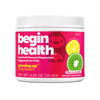Magnesium Gummies vs. Drinks: Which Is Better for Your Kid’s Gut?
share this article

If you’ve been researching ways to help your kiddo poop more regularly, chances are you’ve come across magnesium supplements. From brightly packaged gummies to fruity drink mixes, magnesium is everywhere. But not all forms are created equal, especially when it comes to gut health.
So which one should you choose: magnesium gummies or magnesium drinks? Here’s what parents need to know about absorption, digestion, and choosing the best option for your little one’s routine.
Why Magnesium Matters for Kids’ Digestion
Magnesium is a natural stool softener. It helps draw water into the intestines and relax the muscles in the gut, which can make poops softer, easier to pass, and more regular.⁽¹⁾
It’s especially helpful for:
-
Kids prone to constipation
-
Little ones who struggle with hard, dry stools
-
Picky eaters who don’t get enough magnesium-rich foods like leafy greens, beans, and nuts
How Magnesium Supplements Work
Magnesium comes in different forms. For constipation and gut support, the most studied options are:
-
Magnesium citrate: Well absorbed and effective at softening stools
-
Magnesium glycinate: Gentle on the stomach and good for daily use
Both can be delivered in drinks or gummies—but the format you choose affects how well they work.
Magnesium Gummies: Pros and Cons
Pros
-
Easy to take—especially for kids who love chewy textures
-
Convenient for on-the-go routines
-
Often flavored to mask any mineral taste
Cons
-
Many contain added sugars, dyes, or synthetic sweeteners
-
Limited space in a gummy means lower doses or less effective forms
-
Some use magnesium oxide, which is poorly absorbed and more likely to cause cramping or diarrhea⁽²⁾
-
Can be seen as candy, making it hard to limit intake
Magnesium Drinks: Pros and Cons
Pros
-
Easier to include gut-supportive forms like citrate or glycinate
-
Better for hydration, which enhances the stool-softening effects
-
Can be mixed with other beneficial ingredients like prebiotics or electrolytes
-
Flexible dosing—parents can adjust amounts as needed
-
Generally free of artificial colors or dyes when kid-formulated
Cons
-
May take getting used to the taste
-
Slightly more prep involved (mixing into water or juice)
Begin Health Expert Tip:
Try Growing Up Magnesium from Begin Health, a gentle, daily magnesium supplement drink mix designed for kids 1+. It combines magnesium citrate and glycinate with potassium and prebiotic fiber to support hydration, digestion, and gut motility, all without sugar or artificial ingredients.
So, Which Is Better?
For gut health and constipation support, magnesium drinks are generally more effective than gummies. Here’s why:
-
They provide better forms of magnesium that are easier to absorb
-
They pair well with fluids, which is essential for softening stools
-
They often contain fewer unnecessary additives
-
They allow for more flexible, parent-controlled dosing
Gummies may be fine for general supplementation or older kids with no digestive concerns—but for toddlers or kiddos struggling with poop problems, a drink mix wins on both function and gut support.
Summary
If your goal is to support your kid’s digestion and prevent constipation, magnesium drinks—especially those with citrate and glycinate—offer a more effective and gut-friendly solution than gummies. Always check the label for the type and dose of magnesium, and choose a supplement that supports hydration and long-term gut health.
















